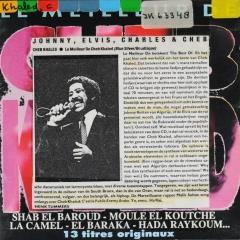
There was even some reggae on "Mektoubi," which merged relatively seamlessly with the North African sound. A mix of producers gave varying sounds, with French hip-hoppers Akhenton & Imhotep proving the hardest on the track "Oran Marseille" with its rapid-fire rap. In 1996, he hit again with Sahra, whose first single, "Aïcha," written for his daughter, gave Khaled a French number one hit. That was firmly cemented the following year with the Was-produced N'ssi N'ssi, which mixed funk, rock, and an Egyptian orchestra behind Khaled's persuasive voice and winning smile for a major commercial breakthrough in France, winning a European, as well as North African, audience. It yielded his first big hit, "Didi," and helped consolidate his reputation as Raï's first superstar. He fared much better with 1992's Khaled, with some tracks produced by Michael Brook and others by Don Was. Arriving with a reputation, he attempted to take his music to a global level, although his real debut, Kutche, did him no favors with its jazz-rock arrangements. By 1986, Khaled (who'd now dropped the Cheb) had been forced to move to Paris, as violence in Algeria claimed lives and he'd been threatened several times (producer Ahmed would, in fact, be murdered, as would several Raï performers). A number of those early tracks can be found on Le Meilleur de Cheb Khaled on Blue Silver.

Khaled was the right voice at the right time and the addition of drum machines, synthesizers, and guitars took the music to a new generation, even though much of it continued to be censored by the Algerian government, which considered the style subversive. Together, they changed the face of the music. It was in the early '80s that Cheb (meaning "young") Khaled's fortunes changed, when he met up with producer Rachid Baba Ahmed, who was revolutionizing the Raï form by introducing Western electric instruments and studio techniques. Leaving home, he began on the peripatetic life of the musician, performing frequently at clubs, parties, and weddings (the only places where Raï was seen as an "acceptable" form of entertainment). He taught himself to play guitar, bass, harmonica, and accordion, releasing his debut disc, "Trigh Lycee," when he was just 14.

Born Khalidu Hajji Brahim in Oran, the traditional center of Raï, he was attracted to music from an early age, especially to Raï, which was seen at the time of the music of outcasts, drunks, and prostitutes, although he also loved James Brown and the Beatles. Certainly he's been its most successful modern exponent, the first to find success on the international stage. Khaled is the poster boy for the modern form of Algerian desert blues known as Raï.


 0 kommentar(er)
0 kommentar(er)
